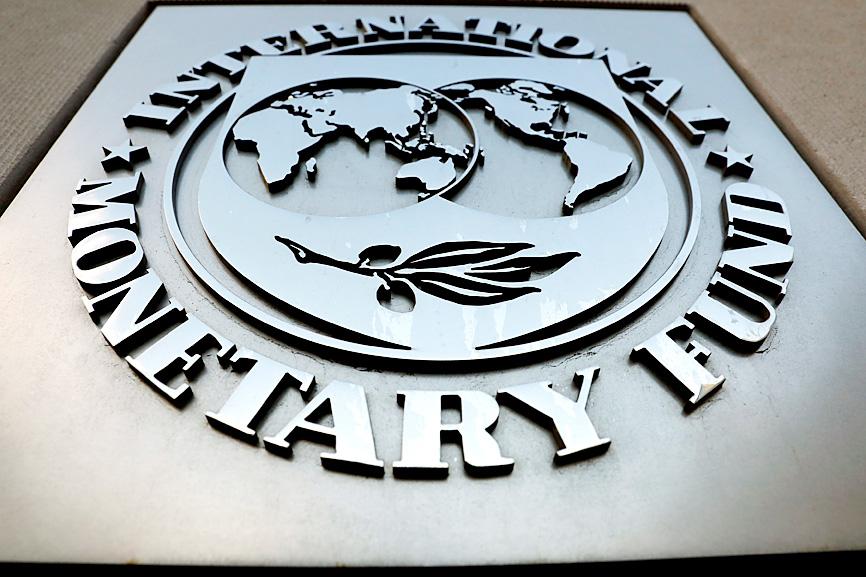The IMF has raised its forecast for Taiwan’s GDP growth this year to 4.7 percent, up 1.5 percentage points from its most recent estimate late last year.
In the IMF’s World Economic Outlook report issued on Tuesday, titled “Managing Divergent Recoveries,” IMF chief economist Gita Gopinath wrote that despite continued uncertainty around the COVID-19 pandemic, economies around the world have shown a “stronger than anticipated rebound.”
As a result, the IMF projected a better global economic recovery compared with its previous forecast in January, she said.

Photo: Yuri Gripas, Reuters
Global economic growth is projected to be 6 percent this year, up 0.5 percentage points from the previous forecast, and 4.4 percent next year, up 0.2 percentage points, after an estimated historic contraction of 3.3 percent last year.
The report predicted that Taiwan’s economy would grow by 4.7 percent this year, up 1.5 percentage points from 3.2 percent growth the IMF forecast in October last year, and that it would grow 3 percent next year.
The estimate was slightly higher than the 4.64 percent annual GDP growth that the Directorate-General of Budget, Accounting and Statistics (DBGAS) forecast in February and the 4.53 percent growth predicted by Taiwan’s central bank last month.
Taiwan’s 3.1 percent GDP growth last year put it first among economies in the Asia-Pacific region, followed by Vietnam with 2.9 percent growth and China with 2.3 percent growth.
Among other economic indicators, the report predicted that Taiwan’s consumer price index (CPI), a major gauge of inflation, would rise 0.9 percent this year and 1.2 percent next year, while the unemployment rate would be 3.8 percent for both years.
The CPI rose 1.37 percent year-on-year in February, while the seasonally adjusted unemployment rate was 3.73 percent, DGBAS figures showed.
Of the other economies comprising the “Four Asian Tigers,” the GDPs of South Korea, Singapore and Hong Kong contracted by 1 percent, 5.4 percent and 6.1 percent respectively last year, the IMF report said.
The same three economies are expected to grow 3.6 percent, 5.2 percent and 4.3 percent respectively this year, and 2.8 percent, 3.2 percent and 3.8 percent next year, it said.
The IMF typically publishes its World Economic Outlook twice a year, in September or October, and in April.
In January, the IMF released a report updating its forecasts for major world economies and regions, but it did not contain specific information about Taiwan.

SEEKING CLARITY: Washington should not adopt measures that create uncertainties for ‘existing semiconductor investments,’ TSMC said referring to its US$165 billion in the US Taiwan Semiconductor Manufacturing Co (TSMC, 台積電) told the US that any future tariffs on Taiwanese semiconductors could reduce demand for chips and derail its pledge to increase its investment in Arizona. “New import restrictions could jeopardize current US leadership in the competitive technology industry and create uncertainties for many committed semiconductor capital projects in the US, including TSMC Arizona’s significant investment plan in Phoenix,” the chipmaker wrote in a letter to the US Department of Commerce. TSMC issued the warning in response to a solicitation for comments by the department on a possible tariff on semiconductor imports by US President Donald Trump’s

‘FAILED EXPORT CONTROLS’: Jensen Huang said that Washington should maximize the speed of AI diffusion, because not doing so would give competitors an advantage Nvidia Corp cofounder and chief executive officer Jensen Huang (黃仁勳) yesterday criticized the US government’s restrictions on exports of artificial intelligence (AI) chips to China, saying that the policy was a failure and would only spur China to accelerate AI development. The export controls gave China the spirit, motivation and government support to accelerate AI development, Huang told reporters at the Computex trade show in Taipei. The competition in China is already intense, given its strong software capabilities, extensive technology ecosystems and work efficiency, he said. “All in all, the export controls were a failure. The facts would suggest it,” he said. “The US

The government has launched a three-pronged strategy to attract local and international talent, aiming to position Taiwan as a new global hub following Nvidia Corp’s announcement that it has chosen Taipei as the site of its Taiwan headquarters. Nvidia cofounder and CEO Jensen Huang (黃仁勳) on Monday last week announced during his keynote speech at the Computex trade show in Taipei that the Nvidia Constellation, the company’s planned Taiwan headquarters, would be located in the Beitou-Shilin Technology Park (北投士林科技園區) in Taipei. Huang’s decision to establish a base in Taiwan is “primarily due to Taiwan’s talent pool and its strength in the semiconductor

French President Emmanuel Macron has expressed gratitude to Hon Hai Precision Industry Co (鴻海精密) for its plan to invest approximately 250 million euros (US$278 million) in a joint venture in France focused on the semiconductor and space industries. On his official X account on Tuesday, Macron thanked Hon Hai, also known globally as Foxconn Technology Group (富士康科技集團), for its investment projects announced at Choose France, a flagship economic summit held on Monday to attract foreign investment. In the post, Macron included a GIF displaying the national flag of the Republic of China (Taiwan), as he did for other foreign investors, including China-based